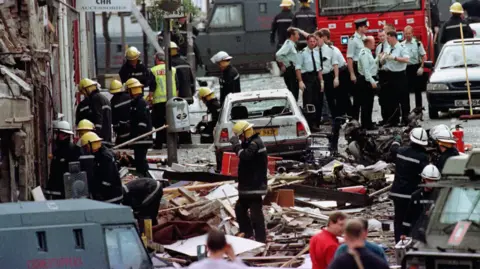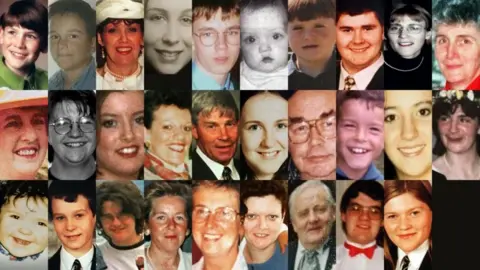Irish government will share material with Omagh bombing inquiry
 PA Media
PA MediaThe Irish government has agreed a co-operation arrangement with the Omagh Bombing Inquiry.
A Memorandum of Understanding (MoU), which had been expected, was signed off at a cabinet meeting in Dublin.
Twenty-nine people, including a woman expecting twins, died in the 1998 Real IRA attack, which was carried out from the Irish Republic.
The MoU will allow the inquiry access to material held by the Irish government.
The inquiry secretary, Sam Hartley, welcomed the agreement.
"This formal agreement marks a significant step forward in allowing the inquiry access to material, information and assistance from the government and agencies in Ireland," he said.
"Agreements of this nature are not commonplace in inquiries.
"On behalf of the inquiry, I express my gratitude to the government of Ireland for its repeated commitment to assist the inquiry."
Some victims' relatives, however, had wanted Dublin to establish a parallel inquiry in its own jurisdiction.
They believe it is the only way to ensure full disclosure of information and compel witnesses based in Ireland to provide evidence.

What have the Omagh families said?
Speaking to the BBC's Evening Extra programme, Michael Gallagher, whose son Aiden died in the bombing, welcomed the Irish government engagement.
"But we need more detail and we need to know in practical terms how this is going to work out," he said.
That the Irish government did not meet the Omagh families while working on the MoU, Mr Gallagher said, was "a huge opportunity missed", adding there were a number of areas within the memorandum that gave cause for concern.
Those concerns, he said, included whether witnesses would give evidence under oath and in which jurisdiction witnesses would give their evidence.
Further detail, Mr Gallagher said, was also needed on how the evidence of gardaí (Irish police) and "intelligence witnesses" would be managed.
He said families should now meet the Irish government to talk through some of those issues.
Mr Gallagher took the legal challenge that resulted in the UK inquiry.
A solicitor, speaking on behalf of the Omagh bereaved families, said they needed time to consider the agreement.
"The families will be very much focusing on ensuring that the providing of materials is done in a manner which is transparent, open to scrutiny and sufficiently independent," he said.
He said the families emphasised that the "determination of the relevancy of materials must be made by the independent inquiry, free from any government interference or overriding objections".
Kenny Donaldson from the group SEFF said he would be considering the contents of the MoU with the bereaved families and injured that his group provides support to.
However he added that the MoU fell short of what they wanted - "either the establishment of a parallel inquiry or empowering the current inquiry to have rights to sit in a Dublin-based court and to call upon whom it deems it needs to hear from".
What have the Irish and UK governments said?
Irish Justice Minister Jim O'Callaghan said the MoU was "an important step forward".
"The agreement provides transparency in relation to how the (Irish) government will fulfil its commitment and provides a clear framework to guide departments and their agencies who may hold materials potentially relevant to the work of the inquiry," the minister said.
Tánaiste (Deputy Prime Minister) and Minister for Foreign Affairs Simon Harris said it was a key step in delivering the Dublin government's previous commitment to addressing the legacy of the Troubles in Northern Ireland.
Northern Ireland Secretary Hilary Benn said the MoU was a "very positive step", adding it would "help enable the independent inquiry to do its job and provide answers for families".
'Significant blind spot'
Analysis: Julian O'Neill BBC News NI crime and justice correspondent
The Irish government has always promised full co-operation with what is a UK statutory public inquiry and they would see this memorandum of understanding as copper fastening that.
The big question that emerges from this is - will it deliver all that is required and expected?
Right from the outset Ireland has been resistant to its own parallel inquiry. This was a terrorist attack conceived and mounted from the Republic of Ireland.
Some victims' relatives would be concerned a UK inquiry will not get to the full truth if there is this significant blind spot.
People will want to digest this, see how it works in practice, but based on what has been said before by some relatives, I think they will have their reservations.
What was the Omagh bomb?
The bomb that devastated Omagh town centre in August 1998 was the biggest single atrocity in the history of the Troubles in Northern Ireland.
It came less than three months after the people of Northern Ireland had voted yes to the Good Friday Agreement.
Who carried out the Omagh bombing?
Three days after the attack, the Real IRA released a statement claiming responsibility for the explosion.
It apologised to "civilian" victims and said its targets had been commercial.
Almost 27 years on, no-one has been convicted of carrying out the murders by a criminal court.
In 2009, a judge ruled that four men - Michael McKevitt, Liam Campbell, Colm Murphy and Seamus Daly were all liable for the Omagh bomb.
The four men were ordered to pay a total of £1.6m in damages to the relatives, but appeals against the ruling delayed the compensation process.
A fifth man, Seamus McKenna, was acquitted in the civil action and later died in a roofing accident in 2013.
